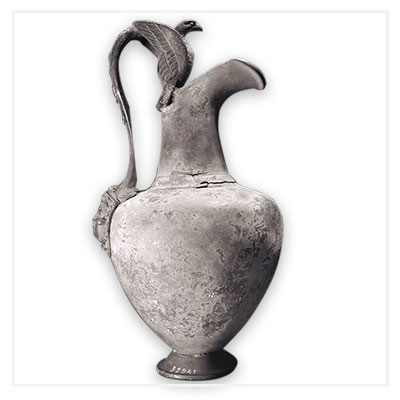The domaine
Since 1887 …
Winemakers for five generations; as a family, we work our 17-hectare vineyard which spreads over 5 Côte de Beaune villages, producing 9 whites and 12 reds.
Our domaine, lying at the heart of Santenay, stretches over the valley of Maranges, as well as the Chassagne-Montrachet, Aloxe-Corton and Ladoix localities. This acreage provides an annual production of 200,000 bottles approximately.
Always striving for the highest quality, we draw on the experience, expertise and technical know-how of each member of the family. Thus, every year we aim to offer wines that will bring you great satisfaction.
We are open every day, and offer advice and commented tastings.



 | The OinochoeThe oinochoe that adorns our bottles has its own story to tell. This bronze vase, used to serve wine, was found at the bottom of an ancient well in Santenay in 1891 by Mariano MESTRE. Perfectly preserved, it measures 26 centimetres in height. It is believed that this oinochoe was issued from an Italian foundry and took its inspiration from the Greek models of the 5th century BC. It is currently displayed in the National Archaeology Museum in Saint-Germain-en-Laye. It was thanks to this historic object that Domaine Mestre was able to acquire the first parcels of its vineyards. |




Expertise
When working our land and our vines we focus on reasoned cultivation. Because of our rigorous work in the vines, the final product can develop its complexity and richness in a range of flavours that are revealed in the wineglass.
The pinot noir vines are 25 to 30 years old on average (some of them being about 60 years of age). The majority of the chardonnay vine stock is a little younger, from 10 to 25 years old (some of them are about 50).
The grapes are harvested manually, with careful sorting at the vines. The grapes are then transported in ventilated boxes to ensure the highest quality of the harvest, before further work is carried out in the vat room using modern methods.
Vinification is still done in a traditional manner, the wine maturing in oak barrels, ¼ of which are new – from 8 to 20 months for the reds, and 6 to 10 months for the whites. The process ends with bottling, after light filtering.
Vinification des rouges
- Harvesting and manual sorting
- Transportation of the grapes in ventilated boxes
- Total destemming and crushing
- Natural alcoholic fermentation
- Vatting for 2 weeks, including pigeage and remontage
- Wiyh a use of new barrel
- Malolactic fermentation is also completed in oak barrels
- Racking and ageing in barrels from 8 to 20 months
- Bottled after light filtering
Vinification of the whites
- Harvesting and manual sorting
- Transportation of the grapes in ventilated boxes
- Immediate pressing of the crushed grapes
- Natural alcoholic fermentation in oak barrel
- Malolactic fermentation is also completed in oak barrels
- Racking and ageing in barrel from 8 months
- Bottled after light filtering
